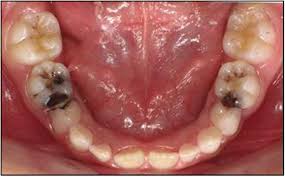Assessment of Fluoride Concentration in Drinking Water and Its Correlation with Dental Caries in Primary School Children in Gharyan, Libya
- Authors
-
-
Hosam Elarabi
Department of Operative Dentistry, Endodontics Faculty of Dentistry, Gharyan University, LibyaAuthor -
Salem Salem
Department of Operative Dentistry, Endodontics Faculty of Dentistry, Gharyan University, LibyaAuthor -
Rajaa Fadel
Department of Oral Biology, Faculty of Dentistry, Gharyan University, LibyaAuthor -
Wafa Abozaid
Department of Oral Biology, Faculty of Dentistry, Gharyan University, LibyaAuthor -
Abdullah Ahmad
Department of Basic Sciences and Oral Surgery, Faculty of Dentistry, Gharyan University, LibyaAuthor -
Ahmed Shtawa
Department of Biology, Faculty of Science, Gharyan University, LibyaAuthor -
Moftah Ali
Department of Preventive Medicine, Faculty of Dentistry, Zentan University, LibyaAuthor
-
- Keywords:
- Fluoride Concentration, Drinking Water, Dental Caries, Primary School
- Abstract
-
Dental caries is a widespread infectious disease influenced by bacterial activity, dietary factors, and host susceptibility. Community water fluoridation has been a key public health measure for caries prevention, particularly in children. The optimal fluoride concentration in drinking water (0.7 mg/L) balances caries reduction with minimal fluorosis risk. This study assessed fluoride levels in drinking water and their correlation with dental caries in primary school children in Gharyan, Libya. A cross-sectional study was conducted on 350 children (aged 7–10 years) from urban and rural schools in Gharyan. Water samples from five stores and one groundwater source were analyzed for fluoride concentration using an ion-selective electrode. Dental caries was assessed using the dmft/DMFT index. Fluoride levels in water stores were negligible (0.0–0.1 mg/L), while unfiltered groundwater exhibited high concentrations (6.0–7.0 mg/L), exceeding WHO guidelines (1.5 mg/L). The low fluoride availability in most drinking sources suggests limited caries-preventive effects from water fluoridation in this region. The study highlights insufficient fluoride exposure in Gharyan’s public water supply, potentially contributing to higher caries prevalence. Further research is needed to evaluate alternative fluoride delivery methods and assess groundwater safety to optimize oral health outcomes.
- References
- Cover Image
-

- Downloads
- Published
- 2025-06-15
- Issue
- Volume 1, Issue 2, 2025
- Section
- Articles
How to Cite
Similar Articles
- Marfoua Ali, Faraj Sulayman, Elham keeshar, General Health Parameters in Children Aged 6–10 Years in El‑Beyda, Libya , Razi Medical Journal: Volume 2, Issue 1, 2026
- Shahrazad Ahmed, Neyaf Alageedi, Eman Muhsin, Doaa Abdulwahab, The Role of Immune Response in Bacterial Urinary Tract Infections in Iraq: A Review , Razi Medical Journal: Volume 1, Issue 2, 2025
- Faiza Nouh, Salima Elfagi, Flood Impacts on Food Security, Reflections on the Derna Flood: A Systematic Review , Razi Medical Journal: Volume 2, Issue 1, 2026
- Ahmed Atia, Eshraq Alsherif, Astabraq Ali, Raghad Nour Aldden, Samar Mohammed, Additive Effect of High Sugar Intake and Prolonged Screen Exposure on Cognitive Performance in Young Adults , Razi Medical Journal: Volume 2, Issue 1, 2026
- Salahaldin Alfurjany, Shamsi Shamsi, Huda Ibrahim, Hanaa Al-Saidi, Ghada Al-Amin, Comparative Antifungal Efficacy of Ketoconazole and Nystatin on Chlamydospore Production in Candida albicans Isolated from Oral Lesions in Cancer Patients , Razi Medical Journal: Volume 1, Issue 4, 2025
- Mohamed Zeglam, Mohamed Altier, Hala Alhawij, Mohamed Abuagila, A Cross-Sectional Assessment of Bacterial Contamination in Fixed Prosthodontic Impressions Transferred from Clinics to Dental Laboratories: A Study in Tripoli, Libya , Razi Medical Journal: Volume 1, Issue 3, 2025
- Faisal Ali Matoug, Taher Alkesa, Esam Alsaghair, Fathi Elzowawi, Wesam Elsaghayer, Acute Intestinal Obstruction: A Retrospective Study at Misurata Medical Center , Razi Medical Journal: Volume 1, Issue 4, 2025
- Abulgasem Dakhil, Mohamed Abuagela, Abdul Aty Dakhil, Wasim Elarbi, Aisha Elansari, Evaluation of Uterine Fibroids Among Women in Tripoli , Razi Medical Journal: Volume 1, Issue 2, 2025
- Sara Taeb, Ghufran Dehoom, Khuloud Ajaj, Comparison of the Efficacy of Inositol-Containing Medication Only versus Metformin and Inositol among Libyan Infertile Women with Polycystic Ovarian Syndrome , Razi Medical Journal: Volume 1, Issue 3, 2025
- Saleh AbuMahara, Hussein Rujbani, Kefah Elmahdi, Nusaiba Elhammal, Mohamed Abdulwaret, NasrEddine Shagloub, Comparison of Blood Loss in Total Knee Replacement Surgery: Intravenous vs. Intra-Articular Tranexamic Acid Administration: A Study Conducted at Al-Massara and Al-Rasheed Clinics in 2024 , Razi Medical Journal: Volume 1, Issue 3, 2025
You may also start an advanced similarity search for this article.








